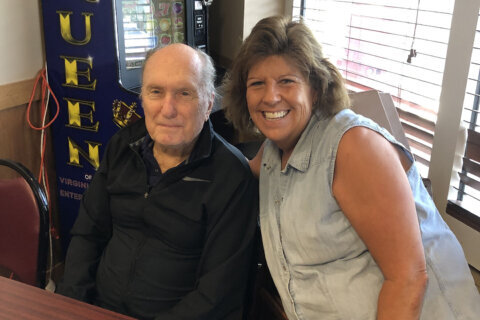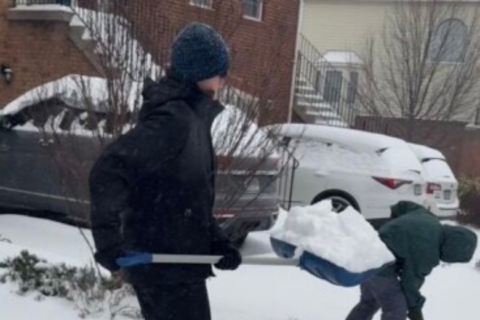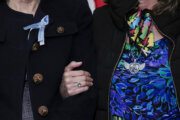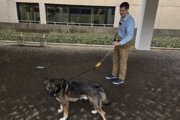What started as a small neighborhood pantry box is feeding hundreds every day in one Loudoun County, Virginia, community.
Just before the coronavirus pandemic started, Leesburg attorney Peter Burnett had set up a little free food pantry in a struggling neighborhood in Leesburg.
“It was January of last year,” said Burnett, who is founder and chairman of the Ampersand Pantry Project. “And the idea was to just have folks in my firm and others that I know who are thoughtful about folks that are having a tough time volunteer to put non-perishables in the pantry box on a regular basis such that people who found themselves in a jam could get something to get through for a day or two.”
But then the pandemic hit, and when he saw the need for much more help, he wanted to do more and called in people he knew to help.
“I got to thinking that maybe some of my friends in the restaurant business and where I have lunch frequently would be willing to make some nutritious lunches and we could put those out for folks.”
So, he turned a building he owned on Market Street, that had previously been a bank with a drive through teller window, into a lunch distribution site.
In the beginning, Burnett tried to predict how long the pandemic would last and how many people would need help. But his projections were way off.
“I thought we’d put out maybe 50, 60, 70 lunches each day and I also thought that we would be doing it for maybe a couple of months,“ Burnett said.
“We did put out 50 the first day, a hundred the second day, and up we went. We’ve been pretty steady in the 250 to 300 range ever since.”
He said the Ampersand Pantry Project has now hit a milestone of 80,000 lunches served.
“If you’d asked me whether we’re going to put out 80,000 when we started, I would have thought that you’d been smoking something,” Burnett said.
It has expanded beyond the Market Street location to two additional ones: on Harrison Street and Edwards Ferry Road.
So, who is using the pantry?
Burnett said the spectrum is broader than you might imagine.
“There are mothers that come through, couples that come through that have a couple kids in car seats in the back. There will be elderly people who are scared of going to the grocery store,” Burnett said.
He said recipients are of every color and race and all socioeconomic levels are represented, at least their socioeconomic levels before the pandemic.
Now, they all have something in common: going through a tough time.
Burnett said he has received some negative comments when people see nice cars in line for the free lunch program.
“I think people don’t think about it until I remind them ‘Oh yeah, that guy driving that nice car didn’t have any trouble buying it when he had a job but now he doesn’t have a job. And he’s still got to make his car payment if he wants to get around, if he wants to take care of his family and interview for other jobs,'” said Burnett.
And some of those nice cars driving through the line do enjoy a free lunch, but then drop a $50 or $100 bill in the donation box, according to Burnett.
The Ampersand Pantry Project receives hundreds of dollars a week through those donations.
It receives other donations via its GoFundMe page.
Running the free lunch program isn’t cheap — it costs about $10,000 a week. He said the community has stepped up and kept the donations coming in so it can keep the meals going out.
A lot of volunteer love has gone into making the lunch program happen. The Ampersand Pantry Project has logged close to 10,000 volunteer hours of work on the project.
Besides lunches, there are days it offers other items such as diapers, dog food and fresh produce. And every day, it has a small bonus for each car — a single carnation.
“Just to try and lighten spirits,” Burnett said. “People really brighten up.”
It has tried to offer extras where it can too. At Christmas, it bought toys for children. At Thanksgiving, it cooked and handed out over 120 turkeys with all the fixings.
“It really has been a gratifying experience and you would not believe how thankful these folks are,” Burnett said. “I’ve never heard so many ‘bless you’ in my life as I’ve heard over the last six or eight months.”
Looking ahead, Burnett said he hopes warm weather, more vaccines and people heading back to work will make what the Ampersand Pantry Project does less necessary.
“I want to be out of business for all the right reasons,” he said.
But he said for now, the need is still great.
“It wouldn’t surprise me if we hit a 100,000 by the time we’re done.”








